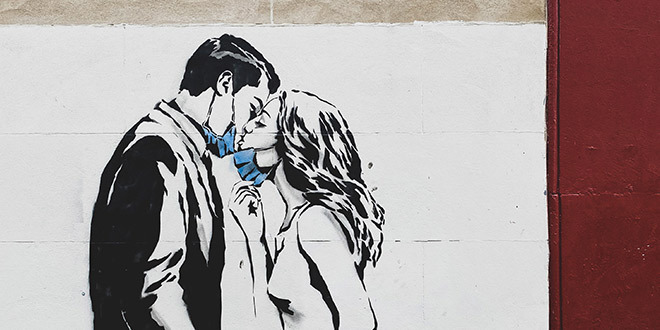
After the unreal month dominated by the global pandemic, all of us are without a doubt craving for our lives to return to their normal state, but it is very likely the normal state of affairs will not be the same as before, and that includes our sex life. To begin with, the result depends on how and when the pandemic will end.

The endgame
There are several scenarios for the end of the coronavirus crisis but the least likely one is that it will just suddenly end and we will return to our previous lives. It is much more likely that restrictions will slowly ease as countries manage to control the spread of the disease (it is happening already in some places) and then, to balance the requirements of epidemiology with those of the economy, the authorities will alternate between tightening and easing the rules for some time – perhaps until the vaccine is ready (which is not likely to happen before next year). Whatever happens, you can be certain it will affect the way we see (and practice) sex.
The physical touch
One thing that has already changed is how we relate to physical contact. For one thing, I work as a yoga teacher which is now an online job, and even before my studio closed its doors due to the epidemic, I was already feeling weird about touching people, wondering if I might unintentionally aid in spreading the deadly disease. For many people, the virtue of physical touch will be a more precious thing, reserved for just a few people for time to come.
We can already observe people nervously flinching when others approach them too close. And we can already see the divide between those that consider distancing measures as inhumane and paranoid, and those that see them as responsible and necessary. That is something that will take time to change and will change the way we touch each other in all, including sexual, contexts.
The value of kissing
As a matter of fact, whether we are aware of it or not, how we relate to kissing and sharing our bodily fluids changes constantly and varies from culture to culture (and between subcultures). In the early 2000s, I was a fan of the techno scene in which it was normal to share all things from bottles and joints to tongue kisses with complete strangers without giving it any thought. There was no Covid-19 back then, but diseases like mononucleosis were real enough threats (which many of us discovered after contracting it). With Covid-19, things get even more complicated because scientists think that a high initial viral load (like the one you’d get from making out with an infected person) could explain why even young healthy people sometimes get critically ill.
Kissing is an intimate thing , for some even more so than penetrative intercourse (think of all the sex workers that never kiss their customers). People of 2020 are likely to become aware of just how intimate it really is.
The paradox of risk taking
While some will be reluctant and confused about touching each other, others will probably process the ordeal of this time by developing a massive and insatiable craving for sex, touch, and risk. That is quite a normal, even if possibly dangerous, human reaction – after all, some parts of the LGBT subculture have processed the trauma of HIV, the disease that decimated the gay community, by developing a virus fetish of bugchasing and even considering the virus as a gift . However, for most, it will not necessarily be about risk – they will just crave squeezing next to strangers’ bodies, touching and having other peoples’ hands all over their own bodies and another tongue or even multiple tongues in their mouths.
The celebration of sex
Dark events like deadly epidemics tend to produce the urge to celebrate life, love and sex. The renaissance was largely a reaction to the horrors of Black Death. In The Decameron by Giovanni Boccaccio, which portrayed liberal sexuality of the era, a group of young people are killing time in quarantine exchanging lascivious stories while Florence is getting ravaged by the plague. We can expect sexual behaviors and subcultures of our time to reflect the same tendency.
The antibody discrimination
Various countries are exploring ways to test for the coronavirus antibody to get the idea who has already recovered from the disease and thus cannot be infected again. Those people would get antibody “certificates” that would allow them to go on with their normal lives while the rest of us remain in various stages of lockdown. This would create a completely new form of discrimination. The one that would certainly have sexual implications. Just think about it – if you were choosing a partner for casual sex, wouldn’t you give some advantage to the one that is certified to be virus free?
Life goes digital
How we relate to physical touch is not the only thing changing. Our relationship with technology is changing as well. Since the beginning of the Internet, there has always been some sort of digital sex, sexting , online dating , and, as soon as the technology became available, streaming and video-sex. This time, however, it is different – life in the digital sphere has never been as mainstream as it is now. I would expect this period to permanently affect the role of technology in the lives of many of us. It is not easy to predict how – it may for instance speed up the adoption of VR technology , which has been with us for some time, but has so far resisted going mainstream.
The post Our sex life after the pandemic appeared first on Volonté .
Intimate Tickles found this article quite interested, and we thought you might to. We give all the credit for this article to Miroslav Zec. Click Here To Read This Article From It's Original Source